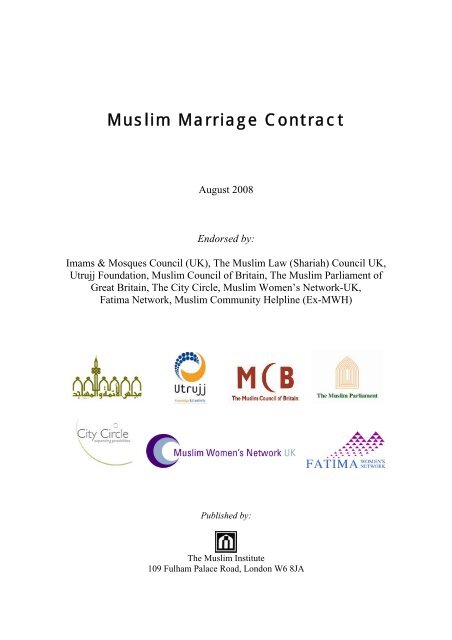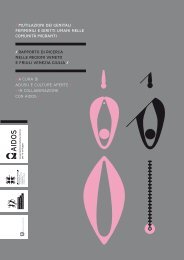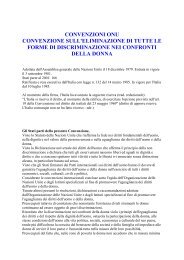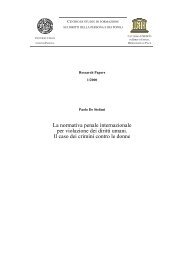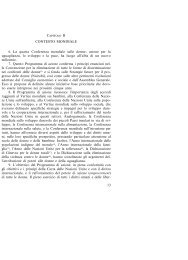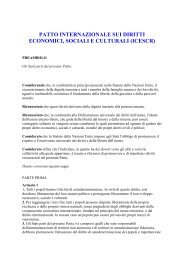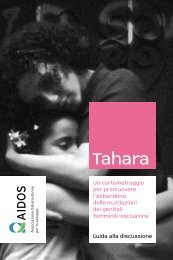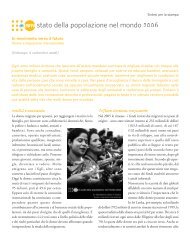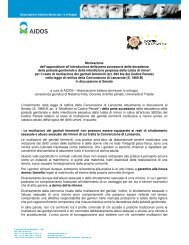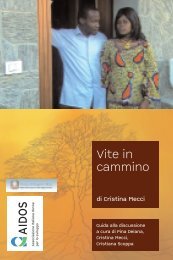Marriage Contract - Muslim Parliament
Marriage Contract - Muslim Parliament
Marriage Contract - Muslim Parliament
You also want an ePaper? Increase the reach of your titles
YUMPU automatically turns print PDFs into web optimized ePapers that Google loves.
<strong>Muslim</strong> <strong>Marriage</strong> <strong>Contract</strong><br />
August 2008<br />
Endorsed by:<br />
Imams & Mosques Council (UK), The <strong>Muslim</strong> Law (Shariah) Council UK,<br />
Utrujj Foundation, <strong>Muslim</strong> Council of Britain, The <strong>Muslim</strong> <strong>Parliament</strong> of<br />
Great Britain, The City Circle, <strong>Muslim</strong> Women’s Network-UK,<br />
Fatima Network, <strong>Muslim</strong> Community Helpline (Ex-MWH)<br />
Published by:<br />
The <strong>Muslim</strong> Institute<br />
109 Fulham Palace Road, London W6 8JA
Introduction: a Guide to a Happy <strong>Marriage</strong><br />
In the Shari‘ah, marriage (nikah) is a relationship of mutual love, mercy and kindness (muwaddah,<br />
sukun, rahmah). In Islamic law marriage is a civil contract between parties which allows them<br />
mutually to agree upon the terms and conditions of their future together. Like any other contract,<br />
the free consent of the parties to the agreement to marry is essential.<br />
Many <strong>Muslim</strong> couples in the UK prefer to have a nikah (marriage contract). In order to avoid any<br />
potential for confusion it is best that the agreed terms and conditions of the contract be put down in<br />
writing. The document titled “<strong>Muslim</strong> <strong>Marriage</strong> Certificate” is designed to inform and when<br />
necessary enable the parties to secure their rights under the mutually agreed contract.<br />
The document has been drafted after prolonged consultation with religious scholars, community<br />
leaders, national and regional <strong>Muslim</strong> organisations, including organisations of <strong>Muslim</strong> women.<br />
The initiative, although led by the <strong>Muslim</strong> Institute, I am delighted to say, has had the support and<br />
full engagement of the most important national <strong>Muslim</strong> organisations.<br />
The document reflects a consensus effort of Islamic scholars and experts in family matters to lay<br />
down and protect the rights of both parties to a nikah (non-registry marriage) guaranteed under the<br />
Shari‘ah. The document consists of a Certificate of <strong>Marriage</strong> explaining the rights and<br />
responsibilities of the parties to the marriage and recording the terms upon which the parties have<br />
agreed to enter into the relationship, with guidelines to facilitate its implementation.<br />
The guidelines accompanying the “<strong>Muslim</strong> <strong>Marriage</strong> Certificate” entitled “Explanatory Notes”<br />
emphasise mutual consultation, the financial independence of the husband and wife and their<br />
shared obligation to support the family. Setting down these matters in writing will allow an<br />
intending couple to agree upon many important matters related to their future lives, together with<br />
the future of any children, and thus the new document should contribute to a harmonious and<br />
happy marriage and family.<br />
The “Certificate of <strong>Marriage</strong>” provides the parties entering into a <strong>Muslim</strong> marriage with written<br />
evidence of their marriage and of the terms and conditions agreed between the spouses. In the<br />
absence of such evidence, parties to a <strong>Muslim</strong> marriage, and in particular women, have till now<br />
faced huge difficulties in securing the financial rights guaranteed to them under the Shari‘ah upon<br />
divorce.<br />
In launching this important document we, the <strong>Muslim</strong> Institute and its partners in this effort,<br />
undertake to do everything to ensure that the document is used in all <strong>Muslim</strong> marriages. We are<br />
also pursuing a campaign to encourage more mosques to become places registered for the<br />
solemnisation of marriage under the 1948 <strong>Marriage</strong> Act. This will ensure that mosques are able to<br />
conduct marriages recognised under English or Scottish law. Thus <strong>Muslim</strong>s married in Britain will<br />
be able to access the British courts regarding marital issues whilst at the same time enabling British<br />
courts to enforce the rights of parties to a <strong>Muslim</strong> marriage in accordance with the Shari‘ah.<br />
The project to develop a model <strong>Muslim</strong> marriage contract was initiated by the <strong>Muslim</strong> <strong>Parliament</strong><br />
of Great Britain in February, 2004, and was subsequently taken up by the <strong>Muslim</strong> Institute.<br />
Mufti Barakatullah of the Islamic Shari‘ah Council, who prepared the original draft of the marriage<br />
contract, continued to lend his full support to the project for its entire duration. Cassandra Balchin,<br />
<strong>Muslim</strong> Women’s Network-UK, drafted the ‘Explanatory Notes’ and kept updating the entire<br />
document after each consultation, which was frequent, and worked tirelessly throughout. Judge<br />
Khurshid Drabu of the <strong>Muslim</strong> Council of Britain proposed many useful amendments and<br />
suggestions for the improvement of the document. Thanks are also due to scholars, professionals<br />
and others who were happy to make their valuable time available to us.<br />
Dr Ghyasuddin Siddiqui<br />
Director, The <strong>Muslim</strong> Institute, London<br />
8 August 2008<br />
Page 1 of 1
<strong>Muslim</strong> <strong>Marriage</strong> <strong>Contract</strong><br />
Explanatory Notes<br />
For a <strong>Muslim</strong> marriage to be valid under the laws of England & Wales the marriage must be<br />
solemnised either at a mosque registered for the solemnisation of marriages or a civil wedding<br />
at a registry office must precede the nikah (<strong>Muslim</strong> marriage).<br />
Completion of this <strong>Marriage</strong> <strong>Contract</strong> allows an intending couple to agree upon many important<br />
matters related to their future lives together and thus contributes to marital harmony. As these<br />
matters can have lifelong effects upon both spouses and any children, it is important that they be<br />
properly discussed beforehand and that both parties read this document carefully.<br />
These notes should be read before completing the <strong>Marriage</strong> Certificate. They explain the<br />
information required in each section.<br />
The <strong>Marriage</strong> Certificate must be completed and signed in triplicate: one copy should be given to<br />
the bride, one to the bridegroom, and remaining one must remain deposited with the Registrar<br />
(Imam/Qadi) who countersigns the certificate.<br />
1. Personal Details of bride and bridegroom<br />
Name, Date, and Place of Birth: These should be written in full and as entered on official<br />
documents, e.g., passport, driving licence. Please ensure spellings are consistent.<br />
Example: Nasir Ahmed Malik, July 20, 1990, Jhelum, Pakistan<br />
Nationality: Indicate all citizenship documents and passports held at the time of completion<br />
of the marriage contract.<br />
Address: Include full permanent address with UK postcode as written in official documents,<br />
e.g., passport, driving licence, bank statements. If the groom and/or bride are not<br />
permanently resident in the UK at the time of completing the <strong>Marriage</strong> <strong>Contract</strong>, enter full<br />
permanent address abroad.<br />
2. Status of bride and bridegroom<br />
Accurate completion of this section ensures that the rights of children from any previous<br />
marital relationship are protected and that the spouses are mutually aware of any existing<br />
financial obligations in relation to children born of any previous marital relationship.<br />
3. Mahr<br />
Mahr is the consideration for the contract of marriage between the parties. It may be in the<br />
form of money and/or goods given by the Bridegroom to the Bride in consideration for the<br />
marriage. It is an essential element of <strong>Muslim</strong> marriage and is exclusively reserved for the<br />
use of the female partner. Payment of Mahr could be immediate (prompt), or deferred.<br />
Full Amount of Mahr: Record the total value of the agreed Mahr, e.g., £5,000 in cash, or<br />
xyz weight in gold.<br />
a) Mu‘ajjal (Immediate/Prompt): This means the total amount of Mahr payable by the<br />
Husband at the time of signing of marriage contract.<br />
b) Mu’wajjal (Deferred): This means the portion of the Mahr which is payable to the wife<br />
at a specified point in the marriage or at the time of dissolution of the marriage through<br />
divorce or death of the husband. Any deferred Mahr that remains unpaid at the time of<br />
dissolution becomes a debt against the former husband’s assets.<br />
Portion of the Mahr paid at the time of marriage: Enter the details of the amount of money<br />
and/or goods received as Mahr at the time of marriage. This does not include general gifts to<br />
the bride from the bridegroom and/or his family unless these be expressly included in (a)<br />
above as part of the amount of Mahr.<br />
Page 2 of 2
Property given in lieu of Mahr: If any immovable property (land, building, share in a house,<br />
flat, etc.) is given by the bridegroom to the bride in lieu of any portion of the Mahr, enter the<br />
full address, details of the property (size, or precise portion of the share). Relevant<br />
supporting legal documents such as copy of title deeds or appropriate entry in the Land<br />
Register must be attached.<br />
4. Property Brought into the <strong>Marriage</strong>, Dowry (Jehez), and Customary gifts<br />
a) Any property the bride brings to the marriage through her own efforts or through<br />
inheritance remains the property of the bride and should be written down;<br />
b) Any customary gifts given by the bride’s family (dowry/jehez) at the time of marriage<br />
remains the property of the bride and should be written down;<br />
c) Any customary gifts given by the bridegroom and/or his family to the bride at the time<br />
of marriage and which are not expressly mentioned as part of the Mahr remains the<br />
property of the bride and should be written down;<br />
5. Witnesses<br />
According to Islamic law, a witness should be sane, adult and reliable. This requirement is<br />
gender/faith neutral. Hence, the <strong>Muslim</strong> <strong>Marriage</strong> Certificate requires to be witnessed by<br />
‘two adult witnesses of good character’.<br />
It is preferable that the witnesses are normally resident in the UK. Personal details should be<br />
written in full and as entered on official documents, e.g., passport, driving licence. Please<br />
ensure spellings are consistent. Include full permanent address with UK postcode as written<br />
in official documents, e.g., passport, driving licence, bank statements.<br />
6. Wali<br />
Parents are responsible for the upbringing of their children. Out of respect and courtesy it is<br />
important that young people involve their parents or guardians throughout the process of<br />
marriage. However, parental or guardian’s legal role finishes when children reach<br />
adulthood. Thereafter their role is optional and complementary. Hence the <strong>Muslim</strong> <strong>Marriage</strong><br />
Certificate does not require the approval of the parents.<br />
7. Divorce<br />
According to Islamic law, marriage is the most sacred commitment in life between two<br />
adults of opposite sex. It attempts to save it wherever possible. As a consequence divorce is<br />
regarded by Allah as the most ‘hated thing’. However, breakdown in marriage does take<br />
place for a variety of reasons. If the divorce is initiated by husband he has to pay the woman<br />
any Mahr that remains unpaid. If the divorce is initiated by the wife, and the husband is<br />
found to be at fault by the arbiters she does not lose her Mahr. But if she cannot prove his<br />
fault, she has to return to her husband whatever Mahr amount she has already received. If<br />
the wife initiates the divorce without any grounds, this is called ‘khula’ and she must return<br />
whatever the husband has given her in consideration for the marriage.<br />
Talaq-e-tafwid is delegated right to divorce given by husband to his wife. If and when the<br />
wife exercises this delegated right she does not lose her Mahr amount.<br />
8. Place of Nikah (<strong>Muslim</strong> <strong>Marriage</strong>)<br />
Enter the full name and address of the mosque or place of marriage.<br />
9. Signatures<br />
Use the same signature as on official documents (e.g., passport, driving-licence, documents<br />
for banking purposes, etc.). The <strong>Marriage</strong> Certificate is not valid unless signed by two<br />
witnesses as well as the bride and bridegroom.<br />
Page 3 of 3
In the name of Allah, the most Beneficent, the most Merciful<br />
‘The stipulations that deserve the highest priority that you fulfil are those through which you make marital relations lawful’ (Bukhari)<br />
<strong>Muslim</strong> <strong>Marriage</strong> Certificate<br />
Serial No.:<br />
Praise be to Allah, the Lord of the Worlds and salutations be upon His messenger Muhammad (peace and blessings be upon him), his<br />
family and his Companions.<br />
With help and success granted by Allah, after confirming that neither contracting party has no legal or other impediments and with<br />
ijab (proposal) and qabul (acceptance):<br />
The nikah (<strong>Muslim</strong> marriage) contract has been concluded between the bridegroom and bride, as per terms and conditions listed<br />
overleaf:<br />
Bridegroom’s full name:……………………………………………………………………..<br />
Date of birth: …………………………. Nationality/ies:………….……….……….………<br />
Place of birth: ………………………….<br />
Address: ……………………………………………………..<br />
Status of Bridegroom: unmarried / divorced / widowed<br />
Bride’s full name:……………………………………………………………………….<br />
Date of birth: ……………………………Nationality/ies: …………………………………<br />
Place of birth: ………………………….<br />
Address: ……………………………………………………..<br />
Status of Bride: unmarried / divorced / widowed<br />
Amount of mahr: ………………………………....<br />
CIVIL MARRIAGE<br />
Reg. No.:………………...<br />
Date:……………………..<br />
District:………………….<br />
The mu’ajjal (immediate/prompt) amount: …………………/ The mu’wajjal (deferred) amount:………………………………..<br />
Whether any property was given in lieu of the whole or any portion of the mahr with specification of the same and its valuation<br />
agreed between the parties:………………………………………………………<br />
In the presence of two witnesses:<br />
• First witness’s name and address: ……………………………………………………………………….………………………<br />
Date of birth: ….………………….Nationality: ……………………<br />
Relationship with bride/groom:…………………<br />
• Second witness’s name and address: …………………………..………………………………………<br />
Date of birth: ….………………….Nationality: ……………….…..<br />
Relationship with bride/groom:…………………<br />
The bride and bridegroom undertake to act properly toward each other in their marital life and in particular as per terms and<br />
conditions listed overleaf. Praise and thanks be to Allah.<br />
The nikah (<strong>Muslim</strong> <strong>Marriage</strong>) ceremony was held at ………………………………………………………on:<br />
The ……….day of …………………...14…… (Hijri). coinciding with ……………..………………200…..<br />
We, the undersigned, put our signature to this contract, being of sound mind and without compulsion or duress.<br />
_________________<br />
Bridegroom’s signature<br />
_________________<br />
Bride’s signature<br />
_________________<br />
First witness<br />
_________________<br />
Second witness<br />
____________________________<br />
Signature of Imam/Qadi & stamp<br />
Name of Imam/Qadi ………………………………………..<br />
Address of associated organisation …………………………<br />
Note: For a <strong>Muslim</strong> marriage to be recognised in British law it must be held at a mosque registered as a place for the solemnisation<br />
of marriage, otherwise the civil ceremony must take place at a registry office first before the nikah (<strong>Muslim</strong> marriage)<br />
ceremony<br />
Page 4 of 4
Terms and conditions of the <strong>Muslim</strong> marriage contract:<br />
Definitions:<br />
Nikah - The <strong>Muslim</strong> contract of marriage;<br />
Mahr - prescribed amount (cash/kind, immediate or deferred) given by the bridegroom to the bride in consideration of the marriage;<br />
Witness – two adult witnesses of good character;<br />
Ijab/Qabul - formal marriage proposal and acceptance;<br />
Husband/wife – bridegroom/bride after marriage contract;<br />
Talaq al-tafwid – delegation of the husband’s power of talaq (divorce) to the wife.<br />
Preamble to <strong>Contract</strong>:<br />
The marriage agreement involves some obligations and rights toward each other sanctified by Allah and His messenger, Muhammad (peace and<br />
blessings be upon him). Fulfilling the terms of this contract is a religious obligation and duty rewarded in this world and hereafter. Violation of these<br />
agreed terms constitutes a sin.<br />
Apart from a formal contractual obligation marriage is also a relationship between two human beings, a man and a woman, that is ideally based on<br />
love, mercy and kindness. The partners are therefore expected to base their behaviour not just on legal rights and duties but on the spirit of goodwill,<br />
generosity, consideration and sympathy, taking into account each other's individual likes and dislikes. They are expected to conduct all family affairs<br />
through mutual consultation in the spirit of giving more than less (Q: 83 : 1-3).<br />
All the rights and obligations expressed or implied hereunder are according to the Shari‘ah derived from the Qur’an, Sunnah, Qiyas and Ijma‘ as<br />
codified by prominent <strong>Muslim</strong> Jurists. Since a marriage contract is a social contract entered into willingly, it recognises and upholds all prevailing<br />
social norms, etiquettes and local customs (implicit or explicit), including the law of the land, which are not in direct contradiction of the Shari‘ah.<br />
Mutual Rights and Obligations:<br />
<strong>Marriage</strong> is a union for life having mutually inclusive benefits and fulfilment for the contracting parties including the following:<br />
• Preservation of chastity and security of gaze<br />
• Companionship inside and outside home<br />
• Emotional and sexual gratification<br />
• Procreation and raising of any children by mutual consultation<br />
• Agreement to live together in a mutually agreed country and establish their matrimonial home therein<br />
• Working collectively towards the socio-economic welfare and stability of the family<br />
• Maintaining their individual property rights but contributing to the welfare of the family according to their capacity<br />
• Maintaining social contacts with family and friends mutually beneficial for the family<br />
• Managing their individual activities/roles inside and outside the home by mutual consultation<br />
Obligations of the husband:<br />
In addition to the mutual duties and obligations, the husband undertakes not to:<br />
• abuse his wife/child(ren) verbally, emotionally, physically, or sexually<br />
• desert/be absent from the marital home for more than 60 days unless by mutual agreement<br />
• withhold economic contribution towards his wife/family<br />
• sexually transmit disease or other transmissible diseases<br />
• misuse /interfere with the wife’s property<br />
Obligations of the Wife:<br />
In addition to the mutual duties and obligations the wife undertakes not to:<br />
• abuse her husband/child(ren) verbally, emotionally, physically, or sexually<br />
• desert/be absent from the marital home for more than 60 days unless by mutual agreement<br />
• sexually transmit disease or other transmissible diseases<br />
• misuse/interfere with the husband’s property<br />
Special Conditions<br />
• Both parties reserve the right to amend/alter the contract through mutual written agreement.<br />
• Both parties undertake to stay loyal to each other and never to engage in extra-marital affairs with the opposite or same sex.<br />
• The husband is not to enter into formal or informal nikah (<strong>Muslim</strong> marriage) contract in the UK or abroad with another woman, as it is<br />
unlawful under the laws of England and Wales as well as the Scottish legal system.<br />
• The husband is to procure separate/independent accommodation from shared or parental abode.<br />
• The husband delegates his power of divorce (talaq al-tafwid) to his wife.<br />
• Details of any additional special conditions mutually agreed upon by bride (Name)……………………………………………………………..<br />
and groom: (Name)………………………………………………………<br />
Arbitration and adjudication<br />
• All differences between husband and wife pertaining to this contract, its interpretation and implementation should be amicably resolved<br />
between themselves.<br />
• However, failing satisfactory resolution of differences, both parties undertake to settle their differences through family consultation and/or<br />
community leaders.<br />
• Before resorting to legal redress through British civil courts parties undertake to seek arbitration/reconciliation through a reputable UK-based<br />
Shari‘ah panel/body/council whose decision shall be morally binding on both parties.<br />
• In matters of child(ren), custody and property possession/division the decision of a British courts will be acceptable to both parties.<br />
Termination of <strong>Marriage</strong> contract<br />
• Parties to this contract undertake to endeavour to do their best to uphold the terms of this contract<br />
• Neither party will end this contract unilaterally without recourse to arbitration/reconciliation by an independent <strong>Muslim</strong> professional body.<br />
• Failing to resolve differences through arbitration/reconciliation they seek legal redress through UK-based Shari‘ah body and/or a British civil<br />
court depending on their circumstances i.e., if the marriage be conducted at a mosque registered for civil marriage, and arbitration fails to<br />
resolve the dispute, the marriage must be dissolved through British court first.<br />
If the marriage was not conducted at a mosque registered for the purpose of the solemnisation of civil marriage and arbitration fails to resolve<br />
the dispute, the marriage can be dissolved without recourse to a British court, but the parties must agree that this process must take place<br />
through a reputable UK-based Shari‘ah/body/council.<br />
© The <strong>Muslim</strong> Institute, London, 2008<br />
Page 5 of 5


